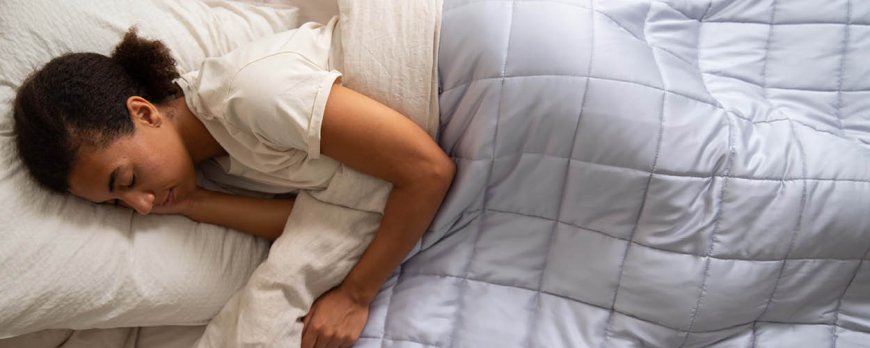Should we drink water before bed?
"Should we drink water before bed?" Explore the pros and cons of this habit to improve your health and promote better sleep. Get your answers here.

Should we drink water before bed?
Many people wonder whether it is a good idea to drink water before going to bed. In this article, we will explore the potential benefits and disadvantages of this habit, providing insights to help you make an informed decision.
Key Takeaways:
- Drinking water before bed can improve hydration, regulate body temperature, enhance mood, and promote better digestion.
- Excessive water intake before bed can lead to interrupted sleep and may have a negative impact on heart health.
- It is generally better to stay hydrated throughout the day and avoid excessive water intake before bed.
- Listening to your body's thirst signals and consulting with a doctor if you have underlying health conditions affecting bladder function is important.
- Consider your individual sleep needs, personal comfort, and sleep quality when deciding whether or not to drink water before bed.
The Benefits of Drinking Water Before Bed
Drinking water before bed can offer several advantages that can positively impact your overall well-being. Here are some key benefits:
- Improved hydration: Our bodies need water to function properly, and staying hydrated throughout the day is important. Drinking water before bed can help ensure that you are adequately hydrated, which can promote optimal health and wellbeing.
- Regulation of body temperature: During sleep, our body temperature naturally drops. Consuming water before bed can help regulate body temperature, keeping you comfortable throughout the night.
- Enhanced mood: Dehydration has been linked to mood disturbances and fatigue. By drinking water before bed, you can help maintain proper hydration levels, which may contribute to improved mood and overall mental well-being.
- Better digestion: Drinking water before bed can aid digestion by helping to soften stool and prevent constipation. It can also support the body's natural detoxification processes, ensuring a healthy digestive system.
While these benefits are significant, it's worth noting that excessive water intake before bed can lead to potential disruptions to sleep. The need to urinate frequently during the night can disrupt your sleep cycle, leaving you feeling tired and groggy the next day.
Additionally, excessive fluid intake before sleep can strain the heart and potentially lead to cardiovascular issues, especially if you have an underlying heart condition. It's important to consider your individual health and consult with a healthcare professional if you have any concerns.
In conclusion, drinking water before bed can have advantages such as improved hydration, regulation of body temperature, enhanced mood, and better digestion. However, it's important to balance this habit with the potential disruptions to sleep and heart health. Staying hydrated throughout the day and listening to your body's thirst signals can help you make informed decisions about drinking water before bed.

Potential Disruptions to Sleep
While staying hydrated during sleep is important, consuming too much water before bed can lead to interruptions in your sleep. Here are some potential disruptions that excessive water intake before sleep may cause:
- Frequent nighttime urination: Drinking a large amount of water before bed can increase the need to urinate during the night, potentially disrupting your sleep. Waking up multiple times to use the bathroom can prevent you from achieving a restful sleep cycle.
- Disturbed sleep quality: Interrupted sleep can lead to decreased sleep quality, leaving you feeling groggy and fatigued the next day. It is important to strike a balance between staying hydrated and minimizing sleep disruptions.
It is generally better to stay hydrated throughout the day and avoid excessive water intake before bed to prevent sleep disruption. Paying attention to your body's thirst signals and adjusting your fluid intake accordingly can help you maintain optimal hydration levels without sacrificing sleep quality. However, individual needs may vary, so it's important to listen to your body and adjust your habits accordingly.
Consulting with a doctor:
If you have underlying health conditions that affect your bladder function, it is advisable to consult with a doctor. They can provide guidance on appropriate hydration practices and help you find a balance between staying adequately hydrated and maintaining good sleep habits.
Impact on Heart Health
It is essential to consider the potential consequences of consuming water before bed, particularly for individuals with existing heart conditions. While staying hydrated is important, excessive fluid intake before sleep can strain the heart and potentially lead to cardiovascular issues. When we consume water, our body works to filter and eliminate the excess fluid through urine. This process can increase fluid volume in the bloodstream and put additional stress on the heart.
If you have a history of heart problems or are at risk for heart disease, it is advisable to discuss with your healthcare provider whether drinking water before bed is safe for you. They can provide personalized guidance based on your specific condition and ensure that your hydration practices align with your overall heart health goals.
For individuals without underlying heart conditions, it is generally recommended to maintain a balanced approach to hydration. Staying adequately hydrated throughout the day by drinking water at regular intervals can help prevent the need for excessive water intake before bed. This can help minimize the potential strain on the heart and promote better sleep quality.
Hydration Tips for Bedtime:
- Drink water in moderation during the evening hours, avoiding large quantities close to bedtime.
- Monitor your urine color to determine hydration levels. Clear or pale yellow urine generally indicates proper hydration, while darker urine may signal a need for more fluids.
- Avoid caffeine and alcohol, as they can disrupt sleep patterns and lead to increased nighttime urination.
- Consider incorporating hydrating foods into your evening snacks, such as fruits and vegetables with high water content.
By following these tips, you can help maintain optimal hydration levels without compromising your sleep or heart health. Remember to listen to your body's thirst signals and make informed choices about drinking water before bed based on your individual needs and circumstances.

Hydration Tips for Bedtime
If you want to ensure proper hydration during sleep without compromising your sleep quality, consider these helpful tips and strategies:
- Drink enough water throughout the day: Staying hydrated during the day is essential for maintaining overall hydration. Make sure to consume an adequate amount of water during waking hours to avoid the need for excessive water intake right before bed.
- Establish a hydration routine: Create a habit of drinking water at regular intervals throughout the day. This can help maintain a consistent hydration level and minimize the likelihood of feeling excessively thirsty before going to bed.
- Limit caffeine and alcohol intake: Both caffeine and alcohol can have diuretic effects, increasing the frequency of nighttime urination. Reduce your consumption of these substances, especially closer to bedtime, to minimize sleep disturbances.
- Avoid large meals and spicy foods: These foods can increase the likelihood of acid reflux or heartburn, which can disrupt sleep. Opt for lighter meals and avoid consuming spicy foods too close to bedtime to ensure a more comfortable sleep.
- Pay attention to your fluid intake: While it's important to stay hydrated, be mindful of how much water you consume in the hours leading up to bedtime. Take sips as needed to quench your thirst, but avoid excessive water intake to prevent frequent trips to the bathroom during the night.
Remember, everyone's hydration needs are different, so it's essential to listen to your body's signals. If you have underlying health conditions affecting bladder function, consult with a healthcare professional to determine the best hydration practices for you. By following these tips and strategies, you can maintain optimal hydration levels while promoting a restful night's sleep.
Listening to Your Body's Signals
Your body's signals can often guide you in making the right decision about drinking water before going to bed. It is crucial to pay attention to these signals and understand your body's needs for hydration. If you feel thirsty before bedtime, it may be an indication that you need to drink water to maintain proper hydration levels throughout the night.
However, it's important to note that everyone's hydration needs vary, and what works for one person may not work for another. Some individuals may find that drinking water before bed leads to disrupted sleep due to frequent trips to the bathroom. In such cases, it may be beneficial to limit fluid intake close to bedtime.
Hydration Tips for Bedtime:
- Avoid consuming large quantities of liquids right before bed to prevent excessive urination during the night.
- Drink enough water throughout the day to adequately hydrate your body before bedtime.
- Consider sipping on a small amount of water if you feel thirsty before sleep, rather than drinking a large glass.
- Listen to your body's signals of thirst and adjust your water intake accordingly.
By following these tips and being mindful of your body's signals, you can make an informed decision about drinking water before going to bed. Remember, it's essential to prioritize overall hydration levels throughout the day and personalize your bedtime hydration routine based on your individual needs and preferences.
Considering Underlying Health Conditions
If you have underlying health conditions that may impact your bladder function, it is advisable to seek guidance from a healthcare professional regarding your hydration needs. These conditions can include urinary tract infections, kidney disease, diabetes, or bladder disorders. Consulting with a doctor will help ensure that you adopt the appropriate hydration practices that suit your specific needs.
Hydration Tips for Bedtime
- Avoid excessive fluid intake before bed: To minimize sleep disruptions from frequent urination, it is recommended to limit your water consumption in the hours leading up to bedtime.
- Hydrate throughout the day: Rather than solely relying on drinking water before sleep, focus on maintaining proper hydration levels throughout the day. It is important to drink enough water during waking hours to meet your body's hydration needs.
- Monitor caffeine and alcohol intake: Both caffeine and alcohol can act as diuretics, increasing urine production and potentially disrupting sleep. Limiting or avoiding these substances close to bedtime can help prevent excessive nighttime urination.
- Listen to your body: Pay attention to your body's thirst signals and drink water when you feel the need. Rather than following a strict schedule, allow your body to guide you in determining when and how much water you should consume.
By considering your individual health conditions and adopting these hydration tips, you can optimize your sleep quality and minimize any potential disturbances caused by drinking water before bed. Remember, it is always best to consult with a healthcare professional to ensure that your hydration practices align with your specific needs.
Staying Hydrated Throughout the Day
One of the key strategies for avoiding excessive water intake before bed is to ensure adequate hydration throughout the day. By maintaining a proper hydration level during the daytime, you can minimize the need for drinking large amounts of water before sleep, which can cause disruptions to your rest.
Here are some useful tips to help you stay hydrated throughout the day:
- Carry a water bottle with you: Having easy access to water throughout the day will remind you to take regular sips and stay hydrated.
- Set reminders: If you tend to forget to drink water, consider setting reminders on your phone or using apps that help track your fluid intake.
- Eat hydrating foods: Include water-rich fruits and vegetables in your diet, such as watermelon, cucumbers, and strawberries.
- Avoid excessive caffeine and alcohol consumption: These substances can dehydrate the body, so it's important to limit their intake and balance them with water consumption.
- Listen to your body: Pay attention to signs of thirst, such as a dry mouth or feeling fatigued, and respond by drinking water.
By implementing these strategies, you can maintain optimal hydration levels throughout the day, reducing the need for excessive water intake before bed and promoting a restful night's sleep.

Your Individual Sleep Needs
Your individual sleep needs and preferences should play a significant role in deciding whether drinking water before sleeping is beneficial for you. It is important to listen to your body's signals and consider factors such as comfort and sleep quality when making this decision.
Some individuals may find that drinking water before bed helps them stay hydrated throughout the night and wake up feeling refreshed. In such cases, it can be beneficial to have a small glass of water before sleep to prevent dehydration and promote optimal bodily functions.
On the other hand, some individuals may find that drinking water before bed leads to frequent nighttime urination, which can disrupt sleep and result in fatigue the next day. If you experience this, it may be better to limit your water intake before bedtime to avoid sleep disturbances.
Considerations for Drinking Water Before Bed
- Pay attention to your body's thirst signals and drink water when you feel genuinely thirsty.
- Avoid excessive water intake before sleep to prevent frequent nighttime urination and potential disruptions to your sleep.
- If you have underlying health conditions that affect bladder function, consult with a healthcare professional to determine the appropriate hydration practices for your specific needs.
- Staying hydrated throughout the day by drinking water at regular intervals can help maintain a proper hydration level before bedtime, reducing the need for excessive water intake during the night.
Ultimately, the decision of whether to drink water before bed should be based on your individual sleep needs and preferences. By understanding your body's signals and considering factors such as personal comfort and sleep quality, you can make an informed choice that supports your overall well-being.
Conclusion
After considering the advantages, disadvantages, and potential disruptions to sleep, it's important to weigh the factors and make an informed decision about whether you should drink water before bed.
Drinking water before bed can have both advantages and disadvantages. Some benefits include improved hydration, regulation of body temperature, improved mood, and better digestion. However, it can also lead to interrupted sleep and negatively impact heart health if it causes frequent nighttime urination.
It is generally better to stay hydrated throughout the day and avoid excessive water intake before bed to prevent sleep disruption. It is important to listen to your body's thirst signals and consult with a doctor if you have underlying health conditions affecting your bladder function.
Ultimately, each individual's sleep needs and personal comfort should guide the decision-making process. If you find that drinking water before bed helps you stay hydrated and doesn't interfere with your sleep, then it may be suitable for you. However, if it leads to frequent nighttime trips to the bathroom or disrupts your sleep quality, it may be better to focus on staying hydrated throughout the day and reducing fluid intake before bedtime.
FAQ
Should we drink water before bed?
Drinking water before bed can have both advantages and disadvantages. It is generally better to stay hydrated throughout the day and avoid excessive water intake before bed to prevent sleep disruption.
What are the benefits of drinking water before bed?
Some potential benefits of drinking water before bed include improved hydration, regulation of body temperature, improved mood, and better digestion.
Can drinking water before bed disrupt sleep?
Yes, excessive water intake before bed can lead to frequent nighttime urination, potentially disturbing your sleep.
Does drinking water before bed impact heart health?
Excessive fluid intake before sleep can strain the heart and potentially lead to cardiovascular issues.
How can I stay hydrated during sleep without drinking water before bed?
It is important to stay hydrated throughout the day and maintain a proper hydration level before bedtime to avoid the need for excessive water intake during the night.
Should I listen to my body's thirst signals when considering drinking water before bed?
Yes, it is important to listen to your body's thirst signals and understand your individual sleep needs when determining whether or not to drink water before bed.
What should individuals with underlying health conditions consider when it comes to drinking water before bed?
Individuals with underlying health conditions that may affect bladder function should consult with a doctor to ensure appropriate hydration practices.
How does staying hydrated throughout the day impact drinking water before bed?
Staying hydrated throughout the day is important to avoid the need for excessive water intake before bed and minimize sleep disruptions.
How do individual sleep needs play a role in deciding whether or not to drink water before bed?
Factors such as personal comfort and sleep quality should be considered when determining whether or not to drink water before bed.
What is the conclusion on whether we should drink water before bed?
It is generally better to stay hydrated throughout the day and avoid excessive water intake before bed to prevent sleep disruption. However, individual factors and health conditions should be taken into consideration.


































































































































